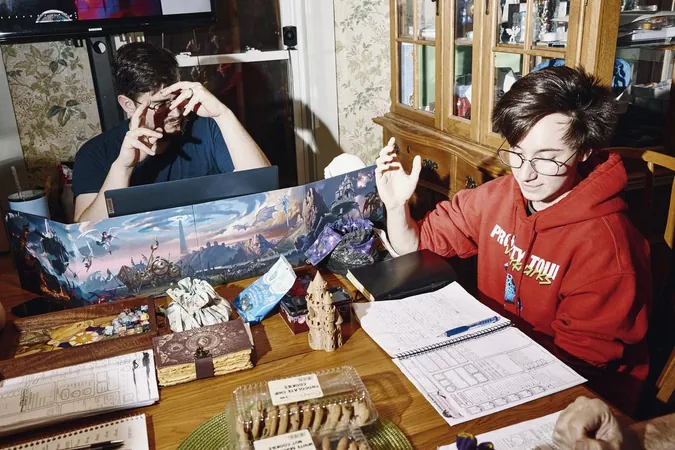
Dungeons & Dragons Embraces Inclusivity with Groundbreaking Rule Changes
2024-12-31
Author: Jia
Introduction
In a significant shift this fall to celebrate its 50th anniversary, Dungeons & Dragons (commonly known as D&D) introduced its first major rule changes in a decade, sparking lively discussions across the gaming community and beyond. The game, which allows fans to immerse themselves in rich fantasy worlds as characters like elves, orcs, and halflings, now redefines “races” as “species,” separating character traits from historical and biological definitions.
Aiming for Inclusivity
The rebranding and restructuring of character attributes aim to make D&D a more inclusive and welcoming experience for all players. Wizards of the Coast, the game's publisher under Hasbro, now encourages players to feel empowered to communicate discomfort during gameplay, fostering an environment that prioritizes sensitivity and respect.
Community Response
Ryan Lessard, a notable dungeon master, emphasized the intent behind these changes: they signal to both current and potential players that Dungeons & Dragons now promotes a safe and thoughtful storytelling approach. However, this initiative has also revealed deep divides among the fanbase, reflecting broader cultural debates on inclusivity versus the preservation of tradition.
Criticism from Traditionalists
Award-winning game designer Robert Kuntz voiced his discontent with the new direction, criticizing Wizards of the Coast for implementing changes from a top-down approach instead of allowing dungeon masters the freedom to shape their campaigns according to their preferences. He noted, “It’s an unnecessary thing,” and expressed concern that altering the term “race” dismisses a meaningful aspect of the game’s character dynamics.
Historical Context and Resurgence
Historically, Dungeons & Dragons had been perceived as niche, struggling with a decline in players, particularly following its fourth edition release in 2008. However, with the rise of popular culture around gaming, including shows like "Stranger Things," the game has seen a resurgence. Jeremy Crawford, the lead rules designer, acknowledged that the community desired more flexibility in character creation, leading to the quick success of the upcoming "2024 Player’s Handbook," which has already broken sales records for the publisher.
Character Creation Flexibility
Remarkably, character creation in D&D involves a mix of species and classes, including popular archetypes like bards, druids, and wizards. This flexibility allows for unique combinations that players have long sought, but some traditionalists feel that new mechanics risk diluting the distinctiveness of various species.
Concerns Over Identity
Critics argue that by eliminating innate species characteristics, Dungeons & Dragons risks transforming all characters into variations of humans. Longtime players express frustration, feeling that the identity and allure of mythical beings are being undermined. Despite this, there appears to be a general sense of optimism among many in the community. Increasingly, players appreciate the move towards a more inclusive game, aligning with trends seen in other roleplaying systems that emphasize ancestry and heritage over traditional descriptions.
Structured Communication
Amid these changes, Wizards of the Coast is also urging more structured communication between players, encouraging a session where topics are discussed upfront to ensure a life-affirming gaming experience. Dungeon masters are taught to adopt methods allowing players to signal discomfort without needing to engage in lengthy discussions about sensitive topics.
Looking Forward
As the gaming landscape evolves, supporters of the revised rules believe that fostering a respectful and engaging environment is crucial for the longevity of Dungeons & Dragons. John Stavropoulos, a user-experience consultant, believes that the game is charting a positive course, one that aligns with the community's desire to make the experience enjoyable for everyone.
Conclusion
Overall, the Changemakers behind Dungeons & Dragons are aiming for a game that not only entertains but also reflects a commitment to inclusivity. As players continue to evaluate these changes at their gaming tables, only time will tell how this beloved fantasy game balances its storied history with modern values. Whether you’re a seasoned player or new to the realm of tabletop adventures, one thing is clear: Dungeons & Dragons is rolling the dice toward a brighter, more inclusive future!

 Brasil (PT)
Brasil (PT)
 Canada (EN)
Canada (EN)
 Chile (ES)
Chile (ES)
 Česko (CS)
Česko (CS)
 대한민국 (KO)
대한민국 (KO)
 España (ES)
España (ES)
 France (FR)
France (FR)
 Hong Kong (EN)
Hong Kong (EN)
 Italia (IT)
Italia (IT)
 日本 (JA)
日本 (JA)
 Magyarország (HU)
Magyarország (HU)
 Norge (NO)
Norge (NO)
 Polska (PL)
Polska (PL)
 Schweiz (DE)
Schweiz (DE)
 Singapore (EN)
Singapore (EN)
 Sverige (SV)
Sverige (SV)
 Suomi (FI)
Suomi (FI)
 Türkiye (TR)
Türkiye (TR)
 الإمارات العربية المتحدة (AR)
الإمارات العربية المتحدة (AR)